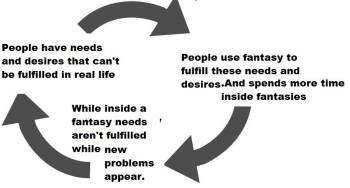Escapism/Analysis
"You are Bella Swan"
People defend her , because they are really defending themselves"—Shmelia RokieYABS'
Phineas: If you could have a super power, which one would it be?
Bufford: That's an interesting question you pose, as it reveals not only one's impulses and desires, but one's deepest fears as well
Have you ever wondered why some people get so obsessed with fantasy that they slowly begin to forget their Real Life? Why some people are always Longing for Fictionland? Why most stories have a Happy Ending? Why Mary Sues exist in the first place? Why the hero of your favorite show is apparently an average person that suddenly finds out he is special and that the people he lives with aren’t his real family? The answer lies inside our souls.
DESIRE

All humans have dreams and desires. Part of our nature as humans is that we always desire something, It doesn’t matter how “rich” or “gifted” a person is. Thanks to this never ending cycle of desire, humanity has evolved as a whole. This non-conformist behavior is what made us abandon our old torches for flashlights, the Stone Age for the modern age, and our old dreams for new ones.
However not all dreams and desires are actually doable in reality. This is the reason fantasy exists.
Though his hierarchy may be debatable by today’s standards we can use Maslow's Pyramid of Needs to classify those desires and understand them better [dead link] . In consequence the relationship desire-fantasy is immense. We'll see that in more detail later.
Some desires are hidden, from others and from ourselves. As a matter of fact, some of these desires are even hidden from the people that desire them. In other words, not even we are aware of our own desires. According to the psychoanalytic school of psychology, this is called repression. This happens for two reasons:
Both fantasy (escapism) and repression are self defense mechanisms our brain uses to cope with reality. They provide a refuge within a situation in which a person is not currently able to cope. These processes are unconscious (meaning that the person is not aware of them), and are normal for a healthy person.
Defining Escapism
Escapism is defined by The Other Wiki as a “mental diversion by means of entertainment or recreation, as an "escape" from the perceived unpleasant or banal aspects of daily life. It can also be used as a term to define the actions people take to help relieve persisting feelings of depression or general sadness.” In other words, people avoid what is unpleasant to them by temporarily forgetting Real Life. Anything that makes you avoid facing reality can be considered a form of escapism: drugs, alcoholism, gambling, video games, smoking,Tv Tropes etc. In this analysis, we are going to focus only on “fantasy-escapism.”
We are our avatars

Every engineer dreams about saving the universe and having sex with aliens. This is much more glamorous than the real life of an engineer, which consists of hiding from the universe and having sex without the participation of other life forms. Consequently, ratings for "Star Trek" will remain high as long as they stay away from any realism.—The Dilbert Principle
You're not a neglected orphan sleeping in a cupboard! You're a wizard! You're the bestest wizard of all and you're also great at sports and you had rich, wizardly parents who loved you so much they died for you (but you've still got their money) and also, we brought you birthday cake!
You are your favorite character. One of the reasons a person enjoys their favorite fictional character is because they unconsciously or consciously want to be that character. People can fulfill their needs and desires through a fictional character or through an anonymous persona. This includes desires that are repressed or things our normal selves would never do. These Escapist Characters are never what we are, but a combination of what we are and what we wish we were. This is called psychological projection.
The main reason people don’t act as how they would in real life is fear of reprisal and the rules that are put by society. For example, one of the reasons games like Grand Theft Auto are so popular is because people are able to break the rules without reprimand.
In essence, fictional characters are a reflection of ourselves. This is one of the reasons people like and/or get obsessed with certain characters. People get into fights, defend, and even fight for the romantic situation of fictional characters. They feel they are that character. In essence, that fictional character is a synonym of your own self. This happens through a process called "identification". It is easier for a person to like a character that has similar attributes, struggles, and defects as themselves. Identification is the “link” between a spectator (fan) and a fictional character. Thanks to this process, spectators (fans) see themselves in the fictional character.
Mary Sue
….Is this who you are, not who you want to be?
--Plushgun, Just Impolite
The Mary Sue is one of the most controversial subjects among fantasy, and everybody has a different definition of the term. The objective of this analysis isn’t to define the term, but to explain it as a psychological phenomenon.
Mary Sues are a specific form of Escapist Character. Despite the lack of a concrete definition, there is one trait that all Mary Sues have in common: all of them are a form of Wish Fulfillment. A Mary Sue is a cry of help from our subconscious and one of the most pure expressions of repressed desire.
Mary Sues are reflections of the person's innermost aspects of their personality. They are made only to fill the mold of the person that created them. That’s exactly why what a person needs and desires in Real Life is going to be expressed through them. While a balanced escapist character represents both what we are (our flaws) and what we wish we were, a Mary Sue is defined by only the latter. They only represent what we wish we were. That perfection has the price of the humanity of that character.
Most Mary Sues are created because their creators have dreams and desires that they are unable to fulfill. They are often created by people that have repressed desires or have experienced many frustrations in their lives. They are used to express suffering and/or frustration. They are a complete or near complete denial of reality. For this reason they can be considered a mechanism of defense and a reflection of who the person really is and what they desperately need in Real Life.
Escapism Through “Anti-Avatars”

” …You both make money off of people's natural insecurities. You show people oddballs so that they'll feel better about themselves… ”—Candace, Phineas and Ferb, "Attack of the 50 Foot Sister"
” …A sense of humor is a major defense against minor troubles.—Mignon McLaughlin
Escapism isn’t always about making an idealized version of ourselves. We can also “escape” through the problems of others. Humor and Tragedy frequently rely on this. People often rely on the suffering of others to forget their own troubles or simply to see their own in a more positive perspective.
Humor and tragedy are ways to escape reality without Escapist Characters. In them, we see not what we wish to be but what is, what we are (in a positive aspect), or what we wouldn’t want to be. This is the reason most humor relies on the suffering of someone or highlighting the defects of a person like stupidity.
Escapism makes you feel better in two ways. It makes you what you wish you were through Escapist Characters. It also makes you feel better by looking at others that are in a situation worse than your own, and we can ultimately identify our own suffering in them. These "anti-avatars" are how people escape through the suffering of others.
How Escapism fulfills our desires and needs .

Now, let's see how fantasy fulfills our needs using Maslow’s hierarchy of needs:
1. Physiological needs are the only kind of needs that can’t be fulfilled trough escapism.
2. Safety needs are the needs of being protected from physical damage, financial harm, or any other kind of threat. We as humans are in constant danger: danger of not having financial security, of being ill, of crime or of getting hurt. The fact that we cannot predict our future coupled with the feeling of being helpless gives us a constant fear. To face insecurity, we either imagine ourselves protected by someone more powerful than us, or we imagine ourselves with money or extraordinary abilities. These abilities are often supernatural in nature, hence the reason the whole concept of superpowers and superheroes exists.
As Elias Canetti wisely said, “There is nothing men fear more than the unknown.” We are also afraid of the future and the uncertain, so we tend to imagine that the future is assured to be happy.
3. Love and belonging is the need for being loved and being accepted by others. Due to the enormous complexity of this desire, it is explained in greater detail below in the section “The Ideal People.”
4. Esteem and valor is the need of having good self-esteem and a positive concept of ourselves. We often feel that we are not special or have no worth, and sometimes we see ourselves as average or below average and without anything special in us. For this reason, we like to imagine ourselves as being special all along in our fantasies.
Often, the hero starts his or her journey as being someone who seems to be average. However, the hero discovers that he is special somehow. They may be a person who is chosen by destiny to have a great future, a Chosen One, the son of a god, of a magical race, or the destined savior of mankind. It is also not uncommon for our fantasy avatar to be portrayed as beautiful. This is for us to feel more secure about ourselves and to feel safe and valued in social interactions.
5. Self-actualization is the need fulfilled at the end of the hero's journey. It is where the hero wants to be from the beginning: the place where they have reached their ultimate potential and can live happily ever after. It's when our dark side (represented by the villain and Shadow Archetype) and our life's hardships (represented by the evil of the story) are beaten. This usually happens at the Grand Finale as the Happy Ending.
While most fantasies try to fulfill all of these needs, there are also specific desires that are fulfilled depending on the particular fantasy work. Common desires include beauty, fame, money, and power. These specific desires can be found in the premise of a particular work; for instance, Harry Potter fulfills the desire of having magical powers.
The Ideal People
”Arnold's grandparents are like fantasy grandparents, the kind you wished you had.”
Craig Bartlett, Creator of Hey Arnold!!
Even a beautiful scenery , even a beautiful flower is meaningless when you see it alone...'—Misao's Song, Magical Project S
While some characters are who we would like to be, others are who we would like to be with.
Usually (though not always), the main character or characters are the people we identify with. Consequentially the characters that interact in a positive way with our "fantasy-avatar" are the characters we like but wouldn't want to be. These are the people we wish we could be with.
No human is truly independent. As social animals, humans are unable to exist by themselves. This desire can be better understood as the need of love. There are three major types of love that are fulfilled through fantasies. Due to the fact that we live in a world of complex relationships and convenience, many relationships are masqueraded as false friendships. People have the need of true love.
The first is called eros, and is defined as a “passionate physical and emotional love based on aesthetic enjoyment; stereotype of romantic love.” It is the "true love" of our Escapist Character. Often, the journey of a hero is also a path of finding and maintaining true love. Fantasy provides this partner that we would like to have in Real Life as an idealized and perfect soulmate. They are often destined to be together.
The second one is called philia, which is defined as the warm affection and loyalty shared between family or friends. True friendship is uncommon for some people in Real Life. Betrayal and masquerades often result in false friendships, which are often the reason people can’t trust one another. While a true friendship needs time and investment in Real Life, in a fantasy setting the protagonist will often obtain tailor-made deep bonds and friendships with little to no time or effort. These friends tend to be very close, trusting and loyal in spite of their flaws, and are even willing to sacrifice everything for each other. In some fantasies, entire groups of friends gravitate towards just one character.
The third kind of love is called storge, which is defined as fondness through familiarity, especially between family members or people who have otherwise found themselves together by chance. In our fantasies, family relationships also tend to be idealized. This is due to the fact that parental figures can be flawed, evil or non-existent In Real Life. Paternal figures are often portrayed as near perfect moral guides. In the lack of paternal or maternal figures, there are always mentor figures who take their places.
An innate desire of human beings is guidance, care, wisdom, protection and paternal and maternal love. None of their flaws will be an obstacle to love and be the best for their son/daughter.
These fictional characters fulfill our needs of love by being the people we would like to be. As the social surrogacy hypothesis says fictional characters replace the lack of social interactions in Real Life. "Providing a temporary substitute for acceptance and belonging that is experienced through social relationships by relieving feelings of depression and loneliness when those relationships are not available."
These needs of love can also be fulfilled trough non-physical virtual communities where people are able to become an idealized version of themselves through an online avatar while at the same time having the freedom to be their true selves (regarding personality). This is kind of fantasy settings is most commonly found in MMORPGs.
Dystopia, Not Escapism?
The worst enemy of fantasy is the mundane. (This is not to be confused with the the desire of being normal or the desire of being accepted or loved.) If people wanted to be average, they wouldn't use fantasy, as most people's lives are normal when compared to their favourite ficitional characters.
Contrary to popular belief, dystopic, Crapsack World settings—such as a Zombie Apocalypse or a horror movie—are forms of escapism, too.
Despite the fact that they are less pleasant than average everyday life, they give something everyday life doesn't: a higher purpose. They break the monotony and make you forget your everyday problems. For instance, the thrill of fighting for survival is not only a perfect excuse to break the rules, but it also implies you are special somehow. You are important enough that something or someone wants to hurt you. Your life becomes so vulnerable that just trying to keep it is exciting. Like riding a roller-coaster, your life isn't really in danger but the illusion of it is thrilling.
You are no longer an average person living an average life. You are a normal person living an extraordinary life.
Secret Escapism
Not all of our desires are accepted, either by others or by ourselves. For that reason, is not uncommon for people to hide their desires—and, consequentially, the fantasy works they "secretly" enjoy, as they fear being rejected by the people around them. Many people secretly enjoy fantasies that they "aren't supposed to enjoy" (by society standards).
Desires are also hidden inside fantasies. A common way of doing this is by "masking" a desire as a flaw, such as a character being So Beautiful It's a Curse. This way, desires are fulfilled for the audience without admitting desiring them.
Role Playing and Addiction

I remember Daddy told me
It all depends on you!
Fairy tales can come true,
But you gotta make them happen,—Almost There, The Princess and the Frog
I never fully understood [the label of 'escapist'] till my friend Professor Tolkien asked me the very simple question, 'What class of men would you expect to be most preoccupied with, and most hostile to, the idea of escape?' and gave the obvious answer: jailers.—C. S. Lewis, "On Science Fiction"
She doesn't go to school or go home.She just plays videogames all day.—Hikari from Neon Genesis Evangelion, referring to Asuka.
As already mentioned, escapism exists to fill a void, need, or desire. It is a means to stop being ourselves for at least a little while and becoming someone else. Thanks to fantasy, we can experience other lives and be other people. By nature, escapist characters tend to have traits that their creators and/or audience do not have. People can imagine themselves as being someone of a different species, age, or even gender.
We tend to roleplay these fantasies through gaming, Fanfiction, dreams, fan talk, and cosplay in order to live out more of these fantasies. Fantasy has a strong influence in Real Life. Some technological advancements are made just to make role playing as someone else more effective, such as 3D technology. Sometimes we are reluctant to abandon our "other lives".
Escapism is not a bad thing in and of itself. It helps to relieve stress, entertain, give lessons, and help others directly or indirectly.
However, escapism can be considered harmful when the audience is caught in what is called the "vicious circle of escapism." Unfortunately, when some people are inside a fantasy, they are unable to actually solve their own problems in Real Life. So, an individual's problems aren't solved or become worse. At the same time, new problems can arise, and they return to their fantasy even more obsessed.
This is made worse by the fact that fictional media are designed to make us addicted. The only way to break the circle is by facing reality instead of escaping it. It is important to remember that unlike fantasy, Real Life is not fair—nor easy. When we realize that we don't need to be "the Chosen One" or be chosen by destiny to have worth, we can accomplish our dreams and find the love we seek in fantasy.
- ↑ you want to kill your teacher
